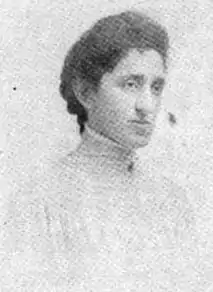Julia I. Felsenthal
Julia I. Felsenthal (October 4, 1867 – November 21, 1954) was an American social worker based in Chicago. She was one of the founders of the National Council of Jewish Women.
Julia I. Felsenthal | |
|---|---|
 Julia I. Felsenthal, from a 1911 publication. | |
| Born | October 4, 1867 Chicago |
| Died | November 21, 1954 Chicago |
| Occupation | Social worker |
Early life
Felsenthal was born in Chicago, the daughter of rabbi Bernhard Felsenthal and Henrietta Blumenfeld Felsenthal. Both of her parents were born in Germany.[1][2]
Career
Felsenthal was a social worker and Jewish community leader, based in Chicago.[3][4] In 1893 she served on the Jewish women's committee at the Columbian Exposition.[1] She was one of the founders and leaders of the National Council of Jewish Women,[5][6] president of the Chicago chapter of the Council of Jewish Women,[7] and vice-president of the National Association of Jewish Social Workers.[8] She was superintendent of the Sinai West Side Sabbath School,[9] and taught correspondence courses through the Jewish Chautauqua Society.[10]
Felsenthal worked one summer at Hull House with Jane Addams.[1] Much of her social work involved the diverse needs of Jewish immigrants.[11] In 1914, she was superintendent of the Jewish Welfare Society in Minneapolis.[1] In 1930 Felsenthal endorsed the Griffin Bill, which would have allowed qualified applicants for naturalization to take the oath of United States citizenship without denying their religious or philosophical reservations about "the lawfulness of war as a means of settling international disputes."[12][13]
Personal life
Felsenthal remained active with Jewish women's organizations in Chicago until the last year of her life.[14] She died in 1954, aged 87 years, in Chicago.[15]
References
- "Jewish Leader to be Cited at Fete on Nov. 28". Chicago Tribune. 1949-11-13. p. 169. Retrieved 2020-06-30 – via Newspapers.com.
- "Miss Julia Felsenthal (photograph)". Chicago Tribune. 1951-12-02. p. 1. Retrieved 2020-06-30 – via Newspapers.com.
- Mandel, E. (1896-11-18). "Problems of the Race". Chicago Tribune. p. 10. Retrieved 2020-06-30 – via Newspapers.com.
- "Jewish Women Hold Election". Chicago Tribune. 1905-05-09. p. 7. Retrieved 2020-06-30 – via Newspapers.com.
- Papers of the Jewish Women's Congress (1893), Berman Jewish Policy Archive, Stanford University.
- "Jewish Women in Council". Chicago Tribune. 1905-12-06. p. 2. Retrieved 2020-06-30 – via Newspapers.com.
- "Jewish Women Hold Election". Chicago Tribune. 1905-05-09. p. 7. Retrieved 2020-06-30 – via Newspapers.com.
- "Cohen is Chosen Jewish Leader". The Indianapolis Star. 1916-05-11. p. 4. Retrieved 2020-06-30 – via Newspapers.com.
- Felsenthal, Julia I. (1909). "Report". The Advocate: America's Jewish Journal. 37: 265.
- "A Correspondence School for Religious School Teachers". Religious Education. 6: 536. January 1912.
- Felsenthal, Julia I. (June 10, 1911). "Report of the Immigration Committee". The Reform Advocate. 41: 748–750.
- United States Congress House Committee on Immigration and Naturalization (1930). Bill to Permit Oath of Allegiance by Candidates for Citizenship to be Made with Certain Reservations: Hearings ... on H.R. 3547. May 8-9, 1930. U.S. Government Printing Office. p. 108.
- McNeil, Marshall (March 14, 1930). "Texan Clashes over War Oath of Citizenship". El Paso Evening Post. p. 18. Retrieved June 30, 2020 – via Newspapers.com.
- Powers, Irene (1954-01-10). "Anniversary Fete Set for Tomorrow". Chicago Tribune. p. 93. Retrieved 2020-06-30 – via Newspapers.com.
- "Julia Felsenthal (death notice)". Chicago Tribune. 1954-11-23. p. 55. Retrieved 2020-06-30 – via Newspapers.com.
External links
- Julia I. Felsenthal at Find a Grave
- Julia I. Felsenthal, "The Influence of the Jewish Religion in the Home" Papers of the Jewish Women's Congress (Chicago, 1893): 122-128.
- Julia I. Felsenthal, "Links of a Chain", The Advocate: America's Jewish Journal 41(May 6, 1911): 481.
- Letter from Julia I. Felsenthal to Jane Addams (October 25, 1908), in the Jane Addams Papers Project, Digital Edition.